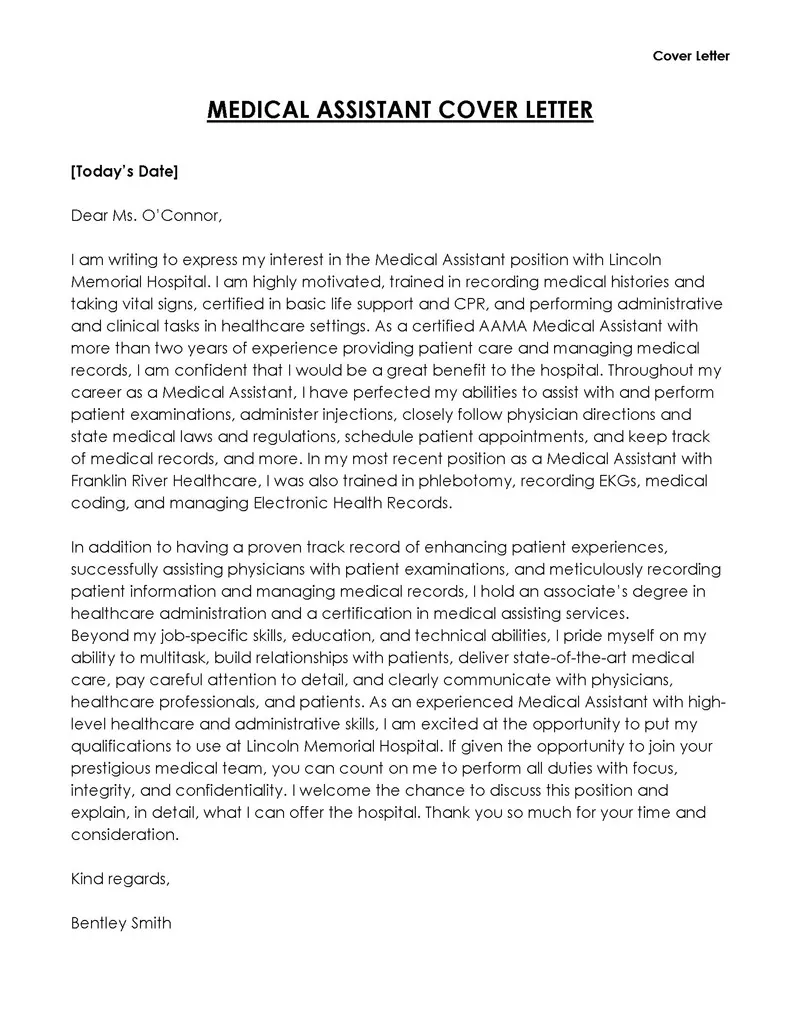Medical Assistant Cover Letter Top 5 Tips
Crafting a compelling medical assistant cover letter is crucial for landing your dream job in the healthcare field. A well-written cover letter not only introduces you to potential employers but also highlights your skills, experience, and personality. It’s your first opportunity to make a strong impression and set yourself apart from other candidates. To help you succeed, here are the top 5 tips to create a standout medical assistant cover letter.
Highlight Your Skills
Begin by showcasing your most relevant skills. Medical assistants have a diverse set of responsibilities, so it’s essential to identify the skills that align with the specific job requirements. Focus on both clinical and administrative abilities. For instance, mention your proficiency in taking patient histories, vital signs, assisting with examinations, and performing basic lab procedures. Don’t forget to include computer skills, such as experience with electronic health records (EHR) systems. Tailoring your skills to match the job description demonstrates that you understand the employer’s needs.
Emphasize Relevant Experience
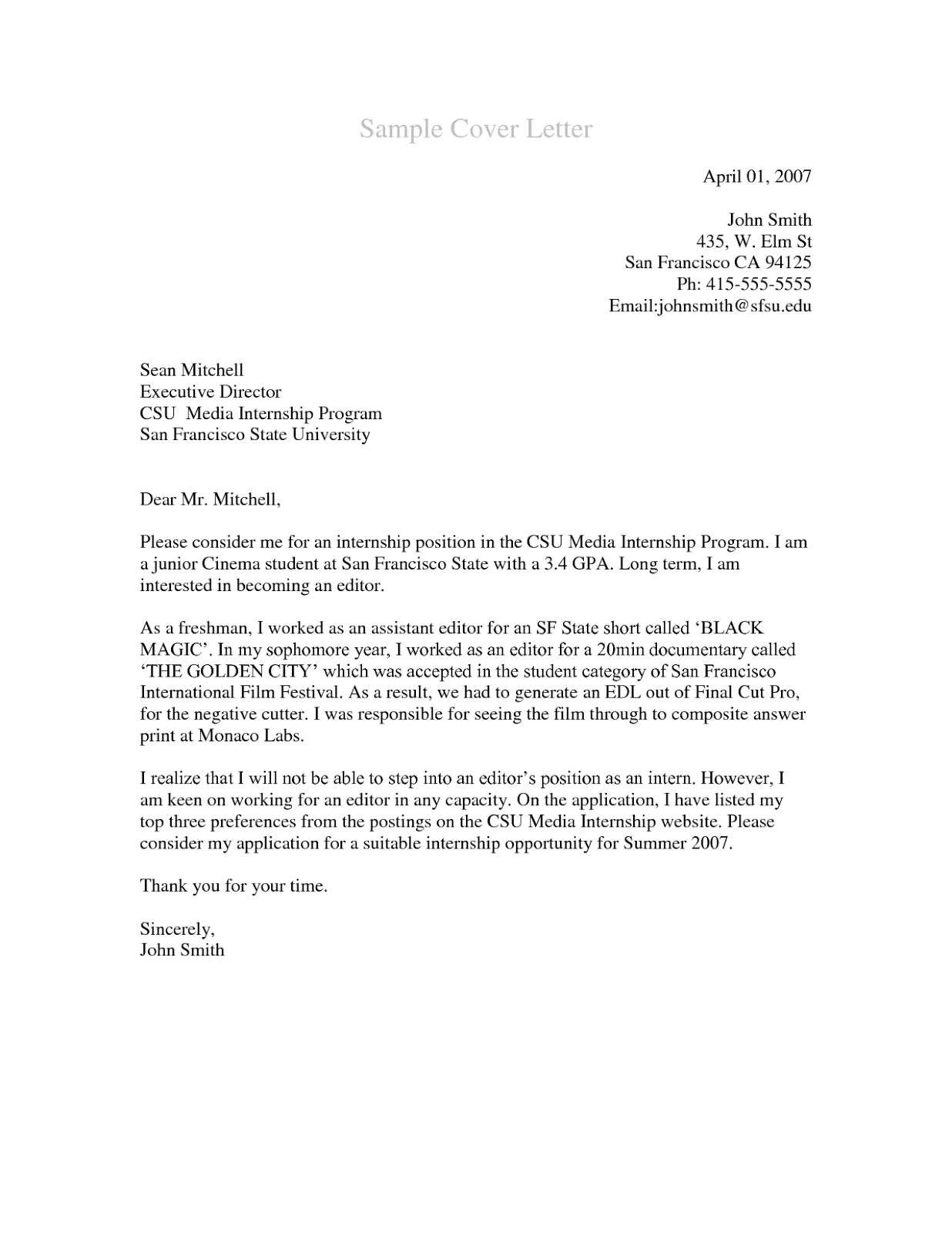
Your experience is a significant asset. Provide specific examples of how you’ve successfully utilized your skills in previous roles. Quantify your achievements whenever possible. For example, instead of saying “Managed patient appointments,” you could say “Managed and scheduled an average of 50 patient appointments daily, reducing wait times by 15%.” This approach demonstrates the impact you’ve made in past positions. If you’re a recent graduate or have limited experience, focus on internships, volunteer work, or relevant coursework to showcase your abilities.
Tailor to the Specific Job
Generic cover letters rarely impress hiring managers. Customize each cover letter to match the specific job and the employer’s needs. Review the job description carefully and identify the key requirements and qualifications. Then, adapt your cover letter to address these points directly. Mention the clinic or practice by name and express your genuine interest in their organization. Research the company’s mission, values, and services. Showing that you’ve done your homework demonstrates your enthusiasm and commitment to the role.
Showcase Your Personality
Your cover letter is an opportunity to showcase your personality and interpersonal skills. Medical assisting is a patient-facing role, so employers seek candidates with excellent communication, empathy, and a positive attitude. Use a professional but friendly tone throughout your letter. Highlight your ability to work well in a team, handle stressful situations, and provide compassionate care. Share a brief anecdote or example that demonstrates your personality and commitment to patient well-being, making you relatable and memorable.
Proofread and Edit Meticulously
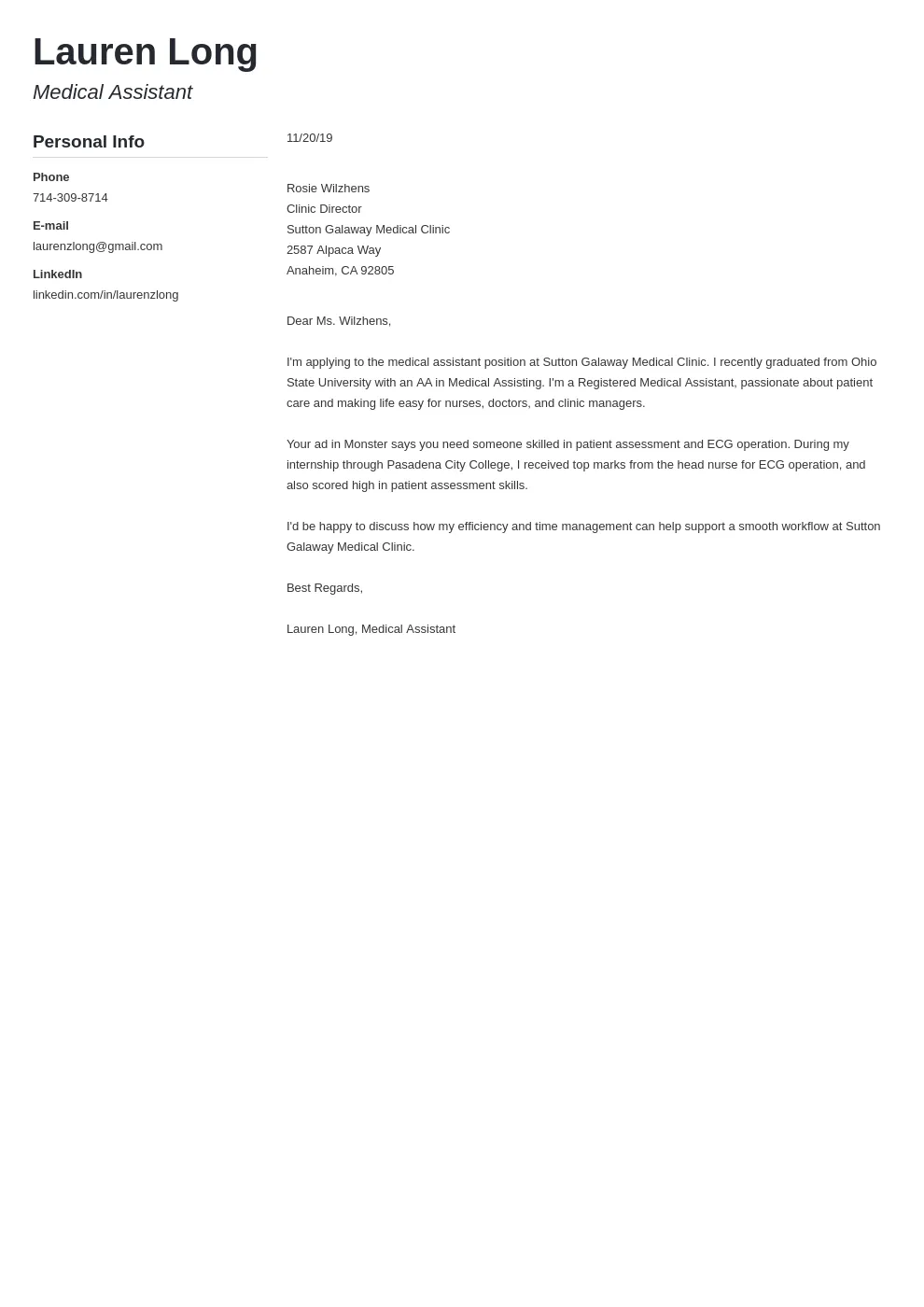
Typos and grammatical errors can damage your credibility. Before submitting your cover letter, proofread it carefully for any mistakes. Read it aloud to catch awkward phrasing or unclear sentences. Ask a friend or family member to review it as well. Ensure your letter is well-organized, easy to read, and free of errors. Pay attention to the formatting, font, and spacing to ensure a professional appearance. A polished cover letter reflects your attention to detail and professionalism, vital qualities for a medical assistant.
Skills to Include in Medical Assistant Cover Letter
A strong medical assistant cover letter should highlight a range of skills to demonstrate your capabilities and suitability for the role. These skills can be broken down into three main categories, each playing a crucial role in the day-to-day responsibilities of a medical assistant. Including relevant skills helps paint a clear picture of your abilities and how you can contribute to the healthcare team.
Clinical Skills
Clinical skills are at the heart of a medical assistant’s role. These skills are directly related to patient care and medical procedures. When listing clinical skills, be specific. Mention your experience with taking patient histories, measuring vital signs (blood pressure, temperature, pulse, and respiration), and assisting with physical examinations. Include any experience you have with phlebotomy, administering injections, and preparing and administering medications. Proficiency in performing basic lab tests (such as urinalysis or blood glucose testing) should also be mentioned. Do not forget skills such as assisting with minor surgeries or procedures, and understanding of sterile techniques. This demonstrates you have practical knowledge and can provide direct patient care.
Administrative Skills
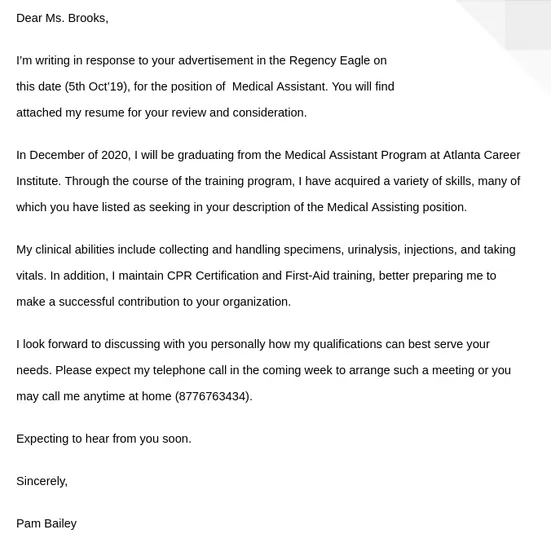
Administrative skills ensure the smooth operation of a medical office. Highlight your experience with scheduling appointments, managing patient records, and handling insurance claims. Mention your proficiency with electronic health record (EHR) systems, as this is a critical skill in modern healthcare. Include your ability to handle patient billing and insurance verification. Strong communication skills (phone etiquette, written correspondence) are essential for interacting with patients, insurance companies, and other healthcare professionals. Mention experience with medical coding or billing software if you have it.
Soft Skills
Soft skills are essential for effective patient interaction and teamwork. Emphasize your ability to communicate clearly and compassionately with patients. Highlight your active listening skills and your ability to build rapport with patients from diverse backgrounds. Mention your problem-solving skills and ability to handle stressful situations calmly. Demonstrate your teamwork skills, showing that you can work effectively with doctors, nurses, and other staff. Demonstrate your attention to detail, organizational abilities, and time management skills. Remember to show a strong work ethic and a commitment to patient care.
Formatting the Medical Assistant Cover Letter
The formatting of your medical assistant cover letter is just as important as the content. Proper formatting ensures your letter is easy to read, professional, and visually appealing. Adhering to standard formatting guidelines demonstrates your attention to detail and professionalism. Here’s a breakdown of key formatting elements to consider.
Header and Contact Information
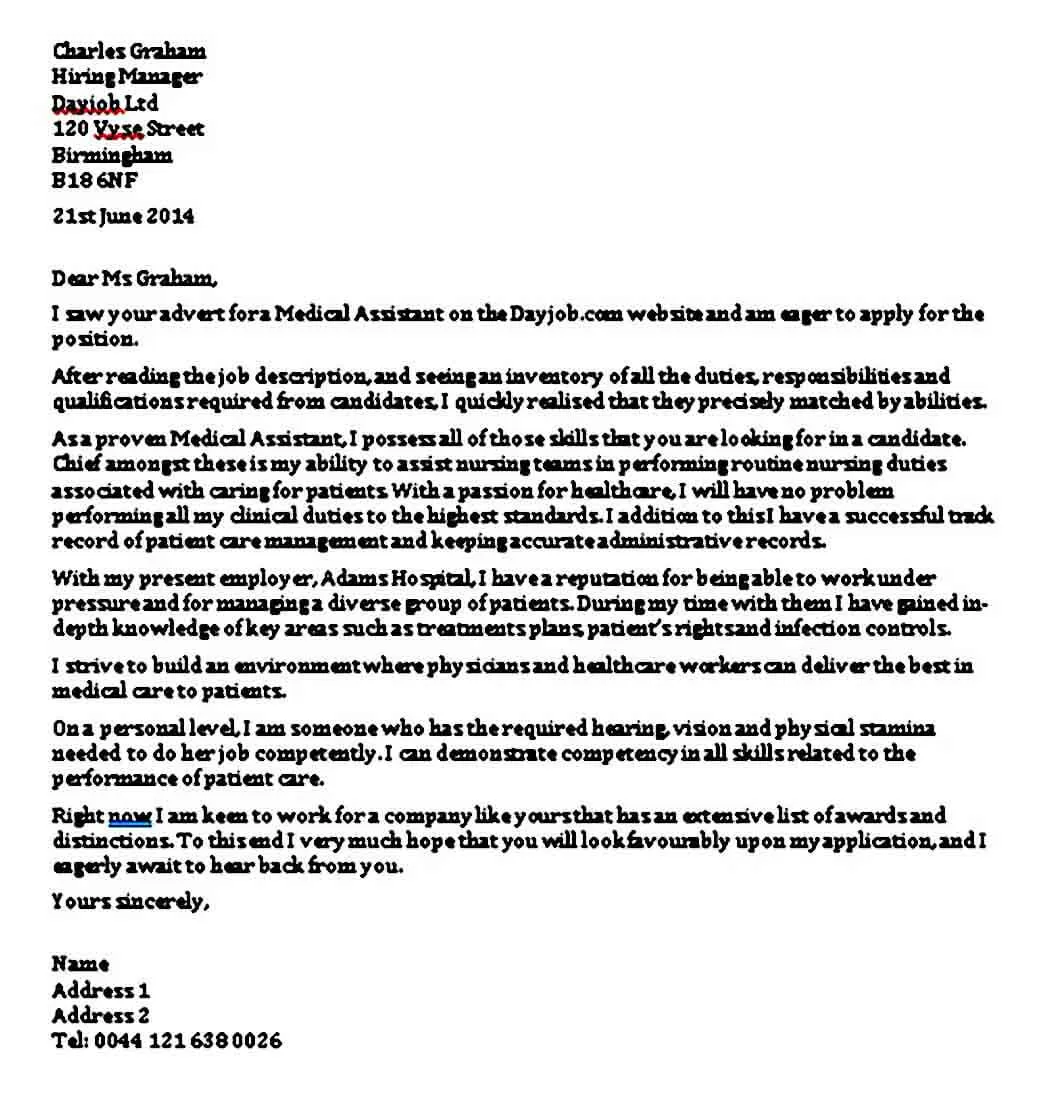
Start with a professional header that includes your full name, address, phone number, and email address. Ensure that your contact information is current and accurate. You can place this information at the top left or right corner of the page. Include the date, followed by the hiring manager’s name, title, and the practice or clinic’s address below your contact information. This formal structure shows that you are professional and respect the recipient’s time.
Salutation
Use a professional salutation to address the hiring manager. If you know the name of the hiring manager, address them by name (e.g., “Dear Dr. Smith” or “Dear Ms. Johnson”). If you cannot find a name, use a general greeting such as “Dear Hiring Manager.” Avoid using generic salutations like “To Whom It May Concern.” This adds a personal touch and shows that you have taken the time to research the company.
Body Paragraphs
The body of your cover letter should be concise and well-structured. Divide your letter into three or four paragraphs. The first paragraph should state your purpose for writing, the position you are applying for, and where you found the job posting. The following paragraphs should highlight your skills and experience. Provide specific examples of how your skills align with the job requirements. Use action verbs to describe your accomplishments. The final paragraph should reiterate your interest in the position and express your gratitude for their time and consideration.
Closing and Signature
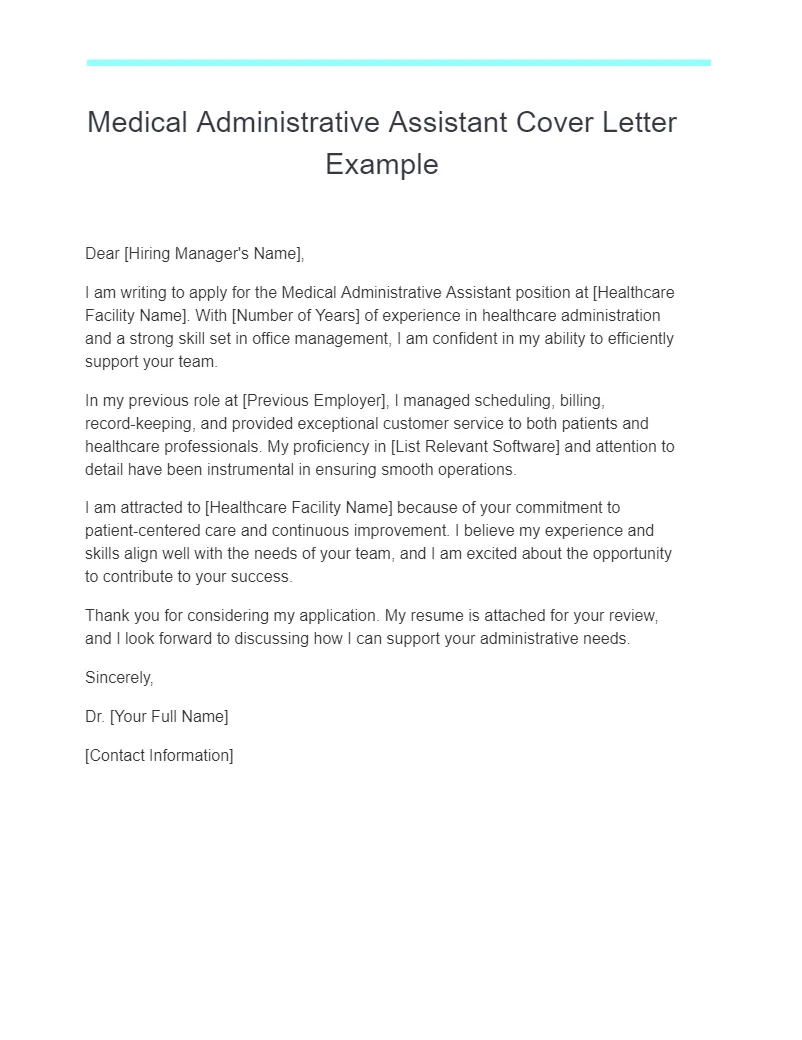
End your cover letter with a professional closing, such as “Sincerely” or “Respectfully.” Leave space for your handwritten signature, and then type your full name below. If you are submitting an electronic cover letter, you can type your name. Consider adding a digital signature. This ensures that your letter looks professional and complete. It also provides a polite and respectful ending to your cover letter.
